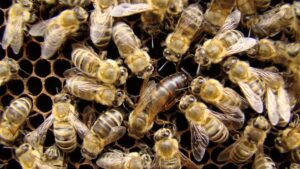The changing British landscape could be contributing to the decline in bee populations, according to Lancaster University research.
Analysis of 35 hives in 20 sites in northwest England found that honeybees living near areas of extensive farmland were surviving on a lower protein diet than those in hives near natural grasslands and woodlands.
Bees consuming less protein early in life might be left vulnerable to other factors such as pesticides, disease or harsh winters.
To conduct their study, the researchers regularly analyzed the composition of ‘beebread’ in different hives — testing its nutritional value throughout the summers of 2012-13.
By combining these data with extensive land-use data generated by Countryside Survey 2007, the research team found that beebread protein content was lower in areas where arable and horticultural farmland surrounded the hives, but beebread found in hives near natural grasslands and broadleaf woodlands had higher protein levels.
The finding that beebread protein content is correlated with land use suggests that landscape composition might impact the well-being of bees.
“This study shows a clear link between landscape and the nutritional ecology of insects,” says Philip Donkersley, who led the research at Lancaster University’s Environment Centre.
“We don’t suggest that we need to get rid of farming to solve this problem — rather that by modifying the food sources available to bees in agricultural areas we could improve their diet and their chances of survival, which could increase their capacity to pollinate crops.”










